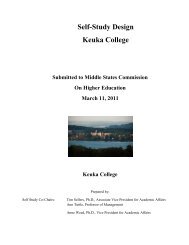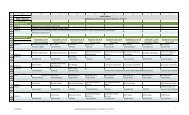final version of the self-study document - Keuka College's Middle ...
final version of the self-study document - Keuka College's Middle ...
final version of the self-study document - Keuka College's Middle ...
Create successful ePaper yourself
Turn your PDF publications into a flip-book with our unique Google optimized e-Paper software.
Because <strong>of</strong> <strong>the</strong> accelerated nature <strong>of</strong> ASAP, <strong>the</strong> process for informing <strong>the</strong>m <strong>of</strong> <strong>the</strong>ir academic status<br />
occurs more frequently than <strong>the</strong> end <strong>of</strong> each semester. In place <strong>of</strong> <strong>the</strong> Academic Review Board, an<br />
Academic Progression and Retention (ARP) Committee meets every o<strong>the</strong>r week to review <strong>the</strong> GPA for<br />
students who have received a C or below in any course within <strong>the</strong> last two weeks and to determine if <strong>the</strong><br />
students are meeting <strong>the</strong> progression requirements <strong>of</strong> <strong>the</strong>ir major program. Students who are not meeting<br />
<strong>the</strong> progression requirements may receive a letter <strong>of</strong> concern, probation, or “stop progress” notification.<br />
This “stop progress” or early intervention process typically stops progression in a program area or<br />
requires a student to join a new cohort to re-take missed/failed courses before a student is required to be<br />
heard at <strong>the</strong> ARP. The ARP committee, <strong>the</strong>n, is typically able to notify <strong>the</strong> students <strong>of</strong> <strong>the</strong>ir status<br />
within two weeks <strong>of</strong> <strong>the</strong> posting <strong>of</strong> <strong>the</strong>ir course grades.<br />
Students in <strong>the</strong> international programs are informed <strong>of</strong> <strong>the</strong>ir status at several checkpoints. To keep <strong>the</strong>m<br />
fully apprised <strong>of</strong> <strong>the</strong>ir status, <strong>the</strong> College monitors student progress at three intervals in <strong>the</strong> program:<br />
at <strong>the</strong> end <strong>of</strong> <strong>the</strong> fall semester <strong>of</strong> <strong>the</strong> sophomore year<br />
at <strong>the</strong> end <strong>of</strong> <strong>the</strong> fall semester <strong>of</strong> <strong>the</strong> junior year<br />
at <strong>the</strong> completion <strong>of</strong> all <strong>the</strong>ir <strong>Keuka</strong> College course work (<strong>the</strong>y may have course work to<br />
complete at <strong>the</strong>ir home institution). At this time, a graduation audit is performed.<br />
Upon <strong>the</strong> completion <strong>of</strong> each review period, <strong>the</strong> <strong>Keuka</strong> College Registrar’s <strong>of</strong>fice evaluates each<br />
overseas student’s record using <strong>the</strong> following criteria to determine academic status:<br />
Minimum 2.0 GPA<br />
Length <strong>of</strong> time since enrollment in program (students have two years beyond <strong>the</strong> original<br />
expected graduation date in which to complete satisfactorily <strong>the</strong>ir <strong>Keuka</strong> College coursework)<br />
These safeguards ensure that <strong>the</strong> students are kept informed <strong>of</strong> <strong>the</strong>ir progress toward degree completion<br />
as well as to ensure that only students having met <strong>the</strong> requirements actually receive <strong>the</strong> degree.<br />
Policies created to support integrity apply to student employment as well. Students involved in work<strong>study</strong><br />
employment positions at <strong>the</strong> College are required to read and sign a Student Employment Contract<br />
and a Confidentiality Statement. These are both designed to guide expectations and behavior<br />
(Appendix 1.15 Student Employment Contract). Similarly, students must submit a signed Field Period<br />
Code <strong>of</strong> Conduct for each Field Period, whe<strong>the</strong>r <strong>the</strong>ir Field Period is in <strong>the</strong> United States or overseas.<br />
The form provides guidelines that detail <strong>the</strong> expectations for <strong>the</strong> students’ behavior while conducting <strong>the</strong><br />
experience (Appendix 1.16 FP Code <strong>of</strong> Conduct Form).<br />
Issues <strong>of</strong> institutional integrity occasionally surface in <strong>the</strong> form <strong>of</strong> conflict between faculty, staff and<br />
and/or students. For <strong>the</strong>se instances, both formal policies and informal practices apply. Student<br />
complaints about faculty or staff members are typically brought to <strong>the</strong>ir academic advisors, division<br />
chairs, or an administrator. In cases that appear to be a misunderstanding, <strong>the</strong> students are encouraged to<br />
meet with <strong>the</strong> faculty or staff member to try to resolve <strong>the</strong> conflict.<br />
In cases when <strong>the</strong> complaint against a faculty member cannot be resolved with a discussion, <strong>the</strong><br />
Associate Vice President for Academic Programs will intervene, meet with all parties involved and<br />
strictly apply <strong>the</strong> policies <strong>of</strong> <strong>the</strong> Institution to mediate <strong>the</strong> case. The Associate Vice President for<br />
Academic Programs may choose to include <strong>the</strong> Vice President <strong>of</strong> Academic Affairs or even consult with<br />
legal counsel to learn if <strong>the</strong> College can be held liable for ethical misconduct on <strong>the</strong> part <strong>of</strong> a faculty<br />
member and determine how to appropriately address ethical misconduct. Student complaints against<br />
staff members are addressed through <strong>the</strong> VP <strong>of</strong> Finance and Administration.<br />
Two handbooks govern College personnel, <strong>the</strong> Faculty Handbook and <strong>the</strong> Employee Handbook and<br />
Supervisor’s Manual. Relevant policies within <strong>the</strong> Employee Handbook are replicated in <strong>the</strong> Faculty<br />
Page 9 <strong>of</strong> 10 Chapter 1: Mission, Goals & Integrity




